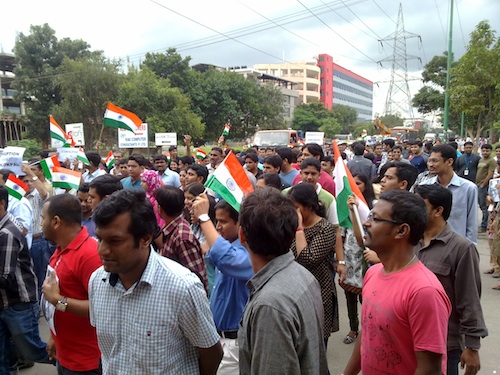In a recent speech, Narayana Murthy, the founder of Infosys, listed things Indians should improve on when interacting with the rest of the world. He mentioned keeping time, being more direct, and then he said,
“We are perhaps the most thin-skinned nation in the world. We see insults where none is meant. We get upset very easily. We think that somebody is out to make India look bad.”
When I heard it, I thought to myself, “Oh no, can he really say that? Someone is going to get offended that he mentioned that,” which, of course, validates exactly what he said.
Indians tend to be a very sensitive people. They care very much how they are viewed by the rest of the world and by each other. If anyone has a negative opinion of India, Indians will be quick to say why that view is unjustified or largely untrue. Search any public forum where people are commenting on India to see an example. One writer recently commented that if webhosts were required to remove all material that any Indian user might find objectionable, “We would be left only with the stock prices”.
Slumdog Millionaire and the Pride of India
The first time I noticed this intense sensitivity was the release of the movie, Slumdog Millionaire. Not since Indiana Jones and the Temple of Doom had there been a broadly viewed mainstream movie focused on India. To outsiders, it seemed like India should be thrilled to be the focus of such a huge blockbuster and highly awarded movie. (AR Rahman’s Oscars are a feather in India’s cap they will never forget.)
Thus, I was surprised to hear it was generating a lot of stir and controversy in India. Many people felt the film’s focus on slum life and communal violence gave a disproportionately negative view of India. The truth of this claim is a different subject, but the point is that most Indians would have much preferred Danny Boyle to make a movie about the life of Amitabh Bachchan. They always want their best face forward, and for them, this movie was not a good face at all.
Putting the best face forward
I used to put together corporate presentations about India, and pulled visuals from a lovely collection of photos taken by expatriates in India. When in India, what do expats take pictures of? Posh residential setups? New corporate buildings? Upwardly mobile New Indians?
No, by and large, expats take pictures of Indian weddings, nature scenes, and Majority Indians and their kids.
Time and time again, I was told in subtle and unsubtle ways to change a picture because the image did not reflect the kind of India the Indian management wanted to show to the world.
Dealing with Sensitivity in India
In The Argumentative Indian, Amartya Sen interprets the “thinskinnedness” of India based on its colonial baggage. He says the British continually reminded them (incorrectly) that their intellectual achievements in mathematics, science, and technology were not legitimate and well behind the European world. Sen suggests this permanently damaged their self- respect and forced them to look for it elsewhere.
Whatever the backstory may be, the Indian propensity towards getting offended easily presents a field of landmines waiting for you to step on. It is essential that you know the taboos and sensitive areas of the “Indias” you interact with, or else you could end up unknowingly ruining relationships forever.
See all articles with the theme #ThinSkinned
Subscribe for new article updates and get the complete eBook – How to Avoid Dying in India!
